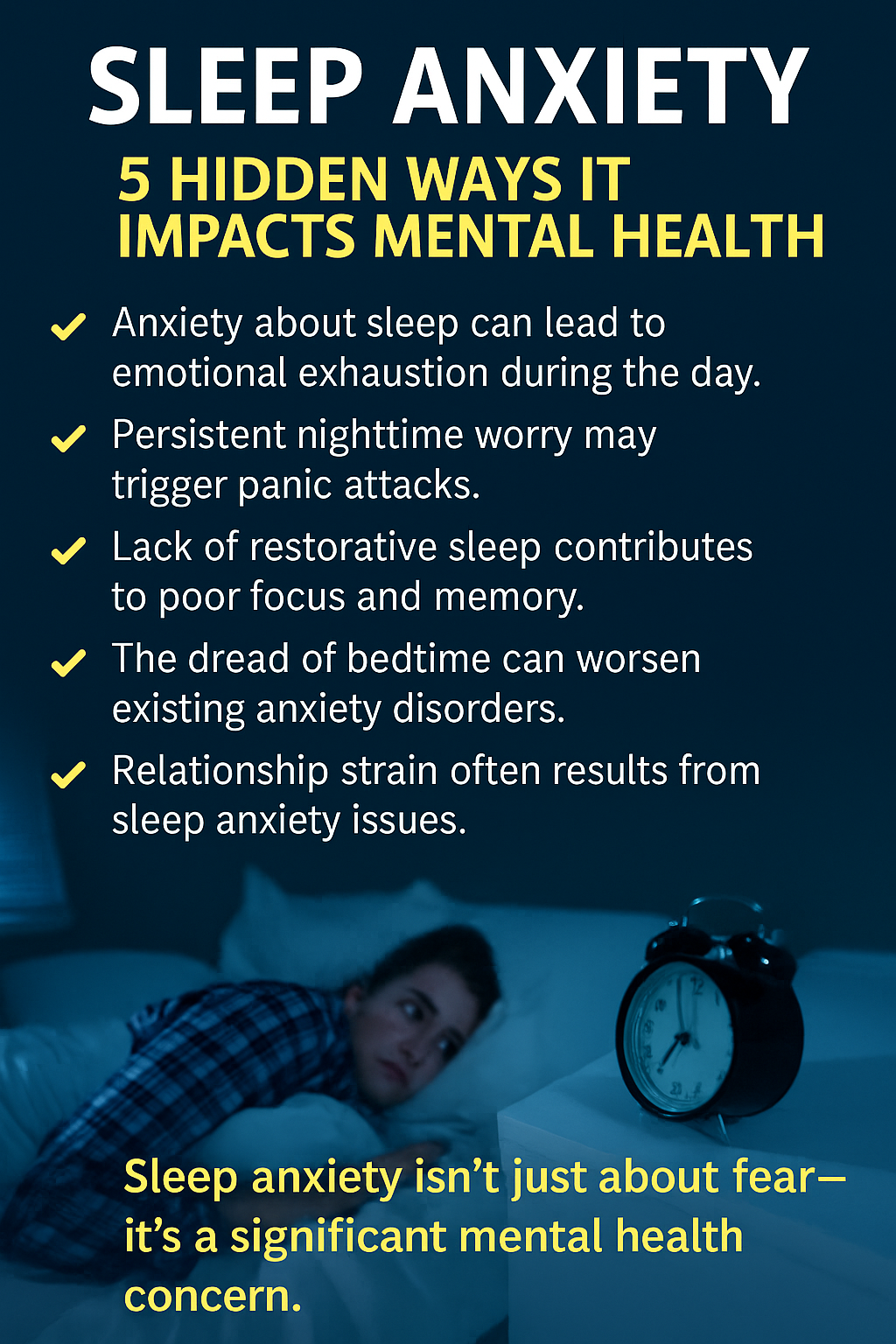
Sleep Anxiety: 7 Powerful Truths About Its Hidden Impact on Your Life
Title: Sleep Anxiety: 5 Hidden Ways It Impacts Your Mental Health
What Is Sleep Anxiety?
Sleep anxiety is the overwhelming fear or stress associated with falling asleep or staying asleep. People suffering from it often find themselves caught in a vicious cycle of worrying about sleep, which in turn prevents them from getting the rest they need. As modern life becomes increasingly stressful, sleep anxiety is becoming more common—affecting not just sleep quality but overall mental well-being.
Its Physical Manifestations
Sleep anxiety doesn’t only affect your mind; it manifests physically too. Symptoms such as increased heart rate, rapid breathing, sweating, trembling, and restlessness are common. These physiological responses make it difficult for the body to relax enough to fall asleep. Over time, the fear of these symptoms occurring can intensify the anxiety itself.
Emotional Exhaustion
One of the most overlooked effects of sleep anxiety is emotional exhaustion. The constant worry about not sleeping enough leads to fatigue during the day, reduced motivation, and irritability. This emotional drain not only affects personal relationships but also hinders daily productivity. People may find themselves snapping at loved ones, failing to focus at work, or feeling persistently overwhelmed.
Cognitive Decline
When sleep is consistently disrupted due to anxiety, cognitive functions take a hit. Sleep anxiety can lead to poor concentration, forgetfulness, and difficulty making decisions. Over time, chronic sleep deprivation caused by sleep anxiety may even contribute to long-term memory problems and increase the risk of developing neurological conditions.
The Vicious Cycle
Sleep anxiety feeds on itself. The more a person worries about their inability to sleep, the more heightened their anxiety becomes—making sleep even more elusive. This cycle leads to an anticipatory anxiety where individuals dread bedtime, further fueling the issue. Without intervention, this loop can significantly deteriorate both mental and physical health.
Panic Attacks
In severe cases, sleep anxiety may trigger panic attacks around bedtime. People may feel a sense of impending doom, chest tightness, or the need to escape their environment. These intense episodes of fear not only delay sleep but can make the thought of going to bed terrifying, worsening the sleep anxiety and leading to insomnia.
Causes of Sleep Anxiety
Several factors contribute towards it:
- Stress and Overthinking: Daily stressors related to work, relationships, or finances often carry into bedtime, making it hard to shut off the mind.
- Previous Trauma or PTSD: People who’ve experienced trauma may associate sleep with vulnerability, leading to nighttime hypervigilance.
- Lifestyle Habits: Caffeine intake late in the day, irregular sleep schedules, and excessive screen time can interfere with the body’s ability to relax.
- Health Conditions: Disorders like generalized anxiety disorder (GAD), depression, or chronic pain can also contribute to sleep anxiety.
When to Seek Help for Sleep Anxiety
It may start off as mild restlessness, but when it starts affecting daily life, it’s time to seek professional help. If you experience the following symptoms for more than a few weeks, it could indicate that you need intervention:
- Difficulty falling or staying asleep
- Fatigue and low energy during the day
- Excessive worry around bedtime
- Physical symptoms like headaches, nausea, or palpitations at night
Its Impact on Relationships
Partners of people with sleep anxiety often find themselves affected too. The person experiencing anxiety may avoid going to bed with their partner, experience mood swings, or withdraw emotionally. This can strain intimacy and communication within the relationship, sometimes leading to conflict or detachment.
Strategies to Manage
Thankfully, there are ways to manage and even overcome sleep anxiety. Here are some effective strategies:
- Cognitive Behavioral Therapy for Insomnia (CBT-I): CBT-I is one of the most recommended treatments. It helps reframe negative thoughts around sleep and replace them with healthier patterns.
- Relaxation Techniques: Breathing exercises, progressive muscle relaxation, and guided imagery can help calm the mind and body before sleep.
- Establish a Sleep Routine: Going to bed and waking up at the same time every day trains your body to follow a consistent rhythm.
- Limit Screen Time Before Bed: Blue light emitted from screens interferes with melatonin production. Aim to turn off devices at least an hour before bedtime.
- Create a Sleep-Friendly Environment: Keep your room cool, dark, and quiet. Comfortable bedding and calming scents like lavender can enhance relaxation.
The Importance of Addressing Sleep Anxiety Early
Left unaddressed, sleep anxiety can spiral into chronic insomnia or other severe mental health conditions. It can also weaken the immune system, disrupt metabolism, and contribute to lifestyle diseases like hypertension and diabetes. Addressing it early with professional guidance is key to restoring healthy sleep and overall well-being.
Conclusion: Reclaiming Restful Nights
Sleep anxiety can rob individuals of the restorative rest they need to function mentally, emotionally, and physically. But it’s important to remember that it’s manageable. With the right coping strategies, lifestyle adjustments, and when necessary, professional help, restful sleep is attainable again.
Understanding and addressing sleep anxiety is not just about sleeping better—it’s about living better.

